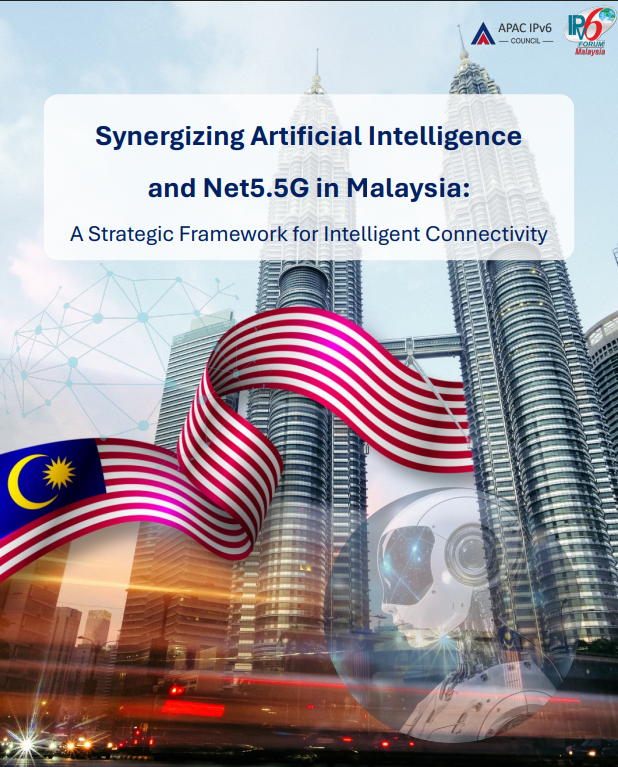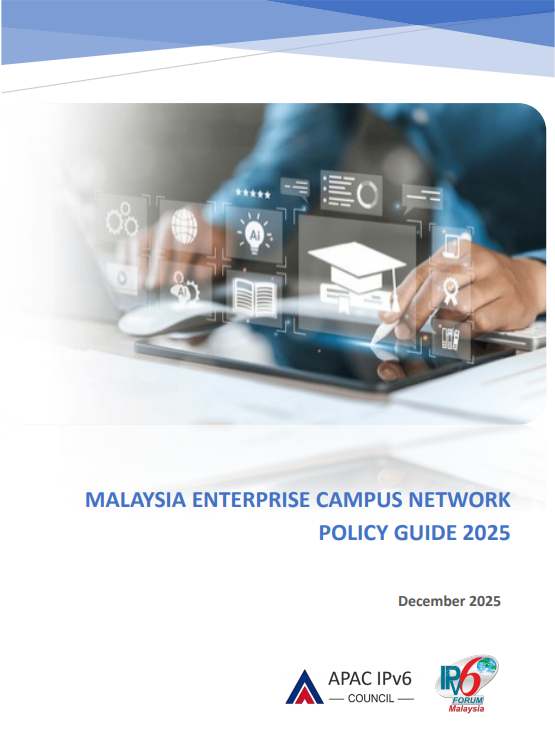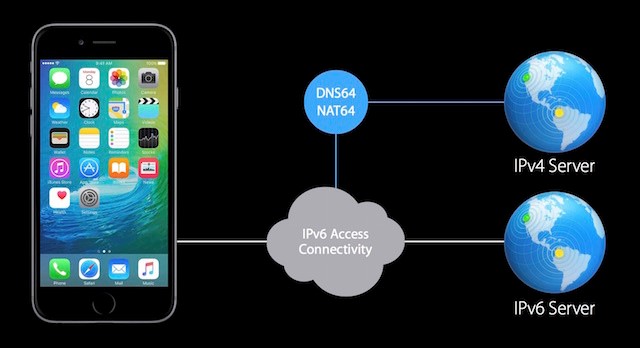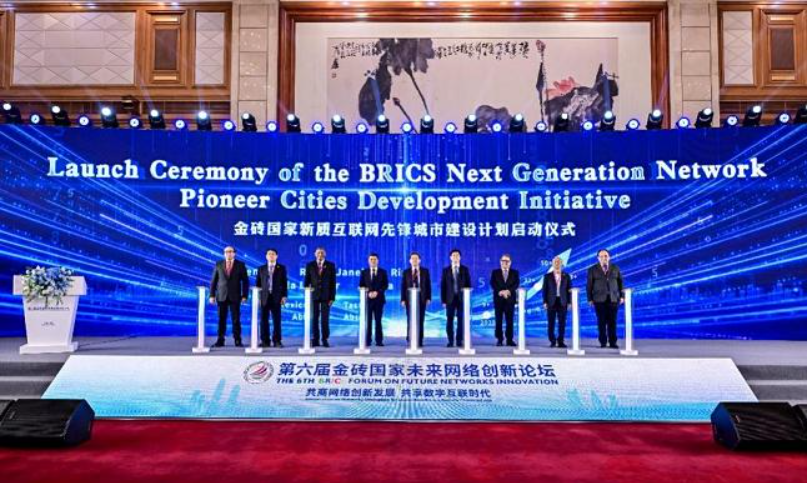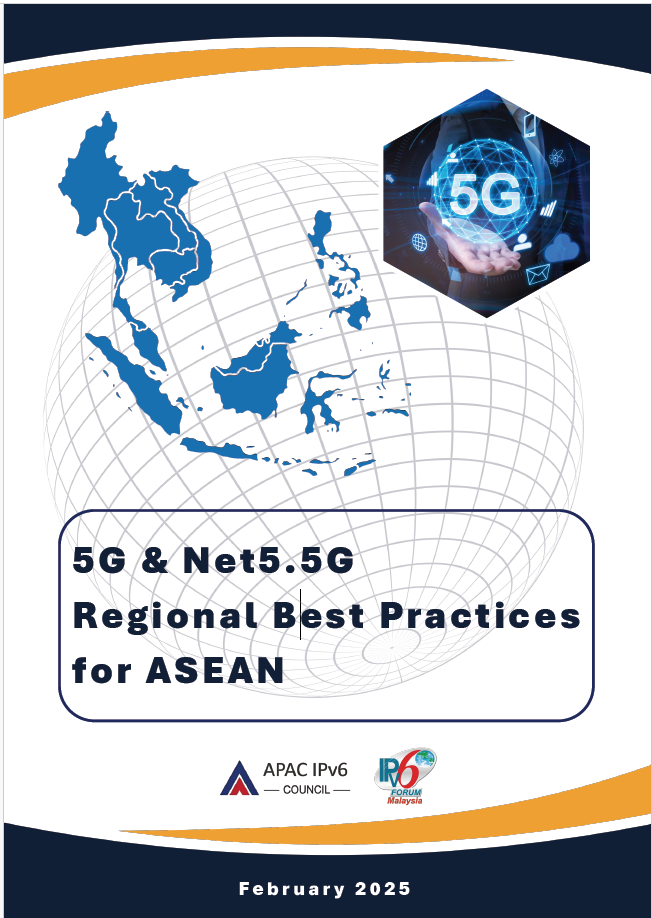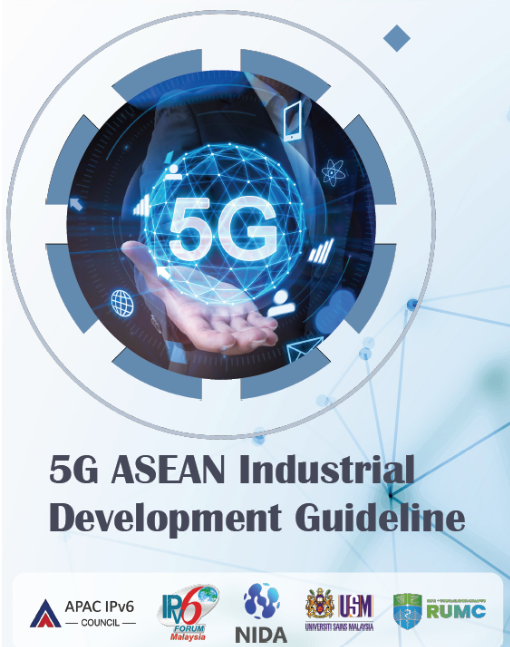APAC IPv6 Council
Council Initiatives
This report, titled “Synergizing AI & Net5.5G in Malaysia” is designed by the APAC IPv6 Council along with the IPv6 Forum Malaysia, to establish the strategic case for Net5.5G as the default connectivity standard for Malaysia’s AI ecosystem.
This whitepaper, Synergizing Artificial Intelligence and Net5.5G in Malaysia: A Strategic Framework for Intelligent Connectivity, arrives at a critical moment in the national discourse. It rightly highlights that next-generation connectivity, including Net5.5G architectures, 400GE/800GE backbones, and advanced wireless technologies, is not merely a question of speed, but a precondition for reliable, low-latency, and deterministic performance required for AI at scale.
This report, titled “Malaysia Enterprise Campus Network Policy Guide” is designed by the APAC IPv6 Council along with the IPv6 Forum Malaysia, to standardize the design and evolution of university networks across Malaysia. Its goal is to ensure every institution has access to consistent, scalable, and secure digital connectivity.
Malaysia’s higher education sector is entering a decisive new phase, where world-class digital infrastructure is no longer a luxury but a prerequisite for competitive teaching, research, and innovation. With this context, the Malaysia Enterprise Campus Network Policy Guide is both timely and necessary, providing a structured roadmap to modernize campus connectivity and align universities with the nation’s broader digital transformation agenda.
A reference table detailing IPv6-only, NAT64, dual-stack, and 464XLAT support across LTE and 5G iPhone models, confirming strong device readiness for IPv6-enabled mobile networks.
Click Here to view the document.
On April 28, 2025, the 6th BRICS Future Network Innovation Forum was launched at the Shenzhen Wuzhou Hotel. More than 200 guests, including government officials, experts and scholars, and business representatives from BRICS and related fields in Brazil, China, Malaysia, Kazakhstan, the Arab region, and other BRICS and global regions, gathered together to discuss in-depth topics such as next-generation network technology innovation, infrastructure evolution, and global cooperation, and discuss the next-generation network development blueprint.
The APAC IPv6 Council, along with the Network Innovation & Development Alliance (NIDA) and representatives of BRICS countries, jointly launched the ‘BRICS New Quality Internet Pioneer City Construction Plan’ during the forum and signed a strategic cooperation memorandum with the Internet Association of Kazakhstan to provide standards and technical consulting services for the construction of Kazakhstan’s pioneer cities.
The Association of Southeast Asian Nations (ASEAN) is undergoing a transformative digital evolution with the rapid deployment of 5G and the emergence of Net5.5G technology.
This report, titled “5G & Net 5.5G Regional Best Practices for ASEAN,” is designed by the APAC IPv6 Council along with the IPv6 Forum Malaysia, explores the current state of adoption, ASEAN’s role in fostering regional collaboration, and the opportunities and challenges associated with these advanced network technologies.
With Malaysia at the helm, ASEAN has a unique opportunity to establish itself as a global leader in leveraging 5G and Net5.5G to drive economic growth, technological innovation, and regional competitiveness. By addressing key challenges and capitalizing on emerging opportunities, ASEAN can build a resilient and future-ready digital economy that benefits all of its member states.
Kuala Lumpur, 31 January 2025 – In an era where digital transformation is reshaping economies and industries, the ASEAN region is gearing up for a significant leap forward with the adoption of Net5.5G. The 5G ASEAN Industrial Development Guideline, released in October 2024, presents a comprehensive roadmap to harnessing the full potential of this next-generation network technology. As ASEAN nations strive to solidify their positions in the global digital economy, Net5.5G emerges as a pivotal enabler of next-generation network technology to enhance industrial growth and connectivity.
The 5G ASEAN Industrial Development Guideline, with an emphasis on Net5.5G, is a result of collaboration among experts in the telecommunications and digital policy space from the Asia Pacific IPv6 Council; the IPv6 Forum Malaysia; the Cybersecurity Research Centre, University of Science Malaysia; the Medical Informatics Department of RCSI & UCD Malaysia Campus (RUMC); and the Network Innovation and Development Alliance (NIDA).
The document opens with a Foreword by Prof. Emeritus Dr. Sureswaran Ramadass, Chairman of the Asia Pacific IPv6 Council and IPv6 Forum Malaysia, who underscores the transformative potential of 5G and Net5.5G. He highlights how these technologies will drive innovation, support IPv6 integration, and foster cross-sectoral collaboration in ASEAN.
Ashish Kapahi, CEO of the ASEAN Economic Forum, provides an economic perspective on the impact of 5G. He projects a potential GDP increase of up to $147 billion by 2025 as a result of enhanced productivity and digital services across industries like healthcare, manufacturing, logistics, and finance. The ASEAN Economic Forum’s role in aligning policy coordination among member states is crucial to ensuring seamless 5G deployment, especially with the deployment of Net5.5G as a complete wired and wireless 5G solution.
Dr. Gopinath Rao Sinniah, Chair of the Reference Panel for the Malaysian Technical Standards Forum Berhad, reinforces this vision by emphasizing the importance of a harmonized approach to 5G implementation. With IoT and cybersecurity being automatically enhanced with Net5.5G, his Preface highlights the necessity of regulatory coordination and a focus on security and privacy as ASEAN advances its digital infrastructure.
Net5.5G: A Step Beyond 5G
While 5G has already begun transforming industries with faster speeds and lower latency, Net5.5G represents the next evolutionary step. With advancements in network intelligence, automation, and ultra-reliable low-latency communications (URLLC), Net5.5G aims to bridge the gap between current 5G capabilities and the emerging demands of AI-driven applications, smart cities, industrial automation, and autonomous systems.
Net5.5G, built on the foundation of IPv6 and next-generation networking technologies, offers key advantages such as:
- High-Quality 10GE Campus Network
- Super-Connectivity Converged IP Network
- Ultra-Efficient Data Centre Network
Economic and Industrial Impact in ASEAN
The ASEAN region stands to benefit immensely from 5G and Net5.5G, particularly in sectors that are poised for digital transformation. The guideline outlines several industries that will experience significant advancements with Net5.5G deployment:
Manufacturing
The introduction of smart factories, powered by real-time machine-to-machine communication and predictive maintenance, will drastically improve productivity. Manufacturers can integrate augmented reality (AR) and virtual reality (VR) tools for remote assistance, quality control, and workforce training.
Healthcare
With telemedicine, AI-driven diagnostics, and remote surgery becoming more viable, Net5.5G will enable superior healthcare services, particularly in remote areas. The low-latency and high-speed data transmission will ensure real-time communication between doctors and patients, improving accessibility and efficiency.
Agriculture
Smart farming solutions leveraging IoT sensors, drones, and AI-powered analytics will help optimize crop management, monitor livestock health, and improve food security. With ASEAN’s significantly large agricultural economy, advanced technologies like Net5.5G can drive precision agriculture and sustainable farming practices.
Education
Remote learning, immersive digital classrooms, and real-time collaboration will be enhanced through Net5.5G. With high-speed connectivity, students in rural and underserved regions can access high-quality educational resources, closing the digital divide.
The Road Ahead for ASEAN
The whitepaper strongly advocates for public-private partnerships (PPPs) to drive 5G, with a focus on Net5.5G adoption. Governments, technology providers, telecom operators, and academic institutions must work together to:
- Develop common standards and regulatory frameworks for seamless Net5.5G implementation.
- Invest in workforce training to ensure a skilled labour force capable of leveraging new technologies.
- Establish cross-border collaborations for knowledge sharing and best practices in 5G deployment.
The 5G ASEAN Industrial Development Guideline serves as a blueprint for ASEAN nations to leverage on 5G and Net5.5G for economic growth and digital inclusion. With the right investments in infrastructure, policy alignment, and workforce development, ASEAN can position itself as a global leader in next-generation connectivity. As Prof. Emeritus Dr. Sureswaran Ramadass reiterated in the Guideline, this initiative is not just about technological advancement, but about creating an inclusive digital ecosystem that empowers businesses, governments, and communities alike. By embracing such advanced technology like 5G and Net5.5G, ASEAN is laying the foundation for a future where connectivity is faster, smarter, and more transformative than ever before.
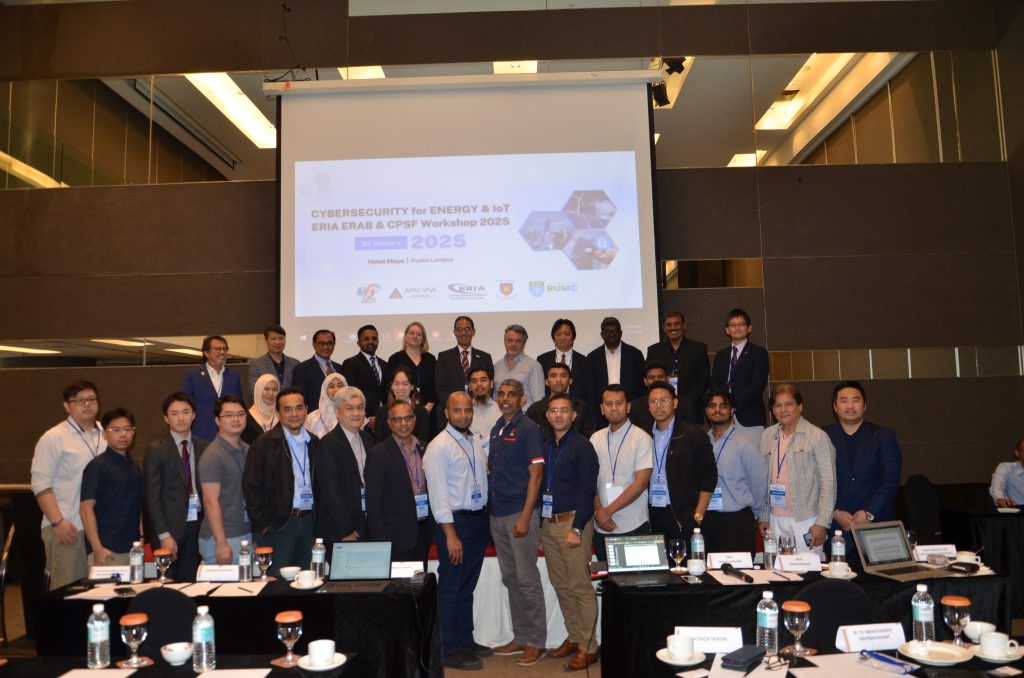
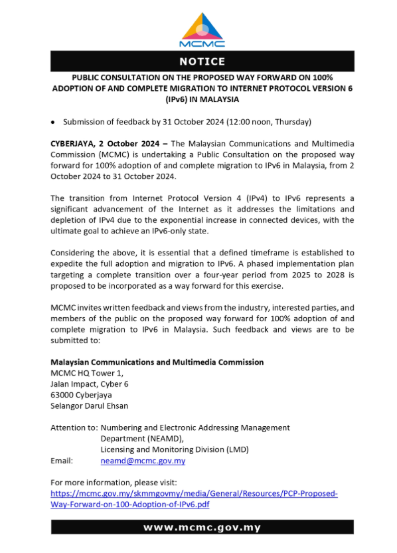
Governments worldwide are now moving towards full IPv6 implementation. APAC IPv6 Council, along with IPv6 Forum Malaysia, assists local businesses and organizations with technology consultation, human capacity building, and upskilling required for the seamless transition to a fully connected IPv6 Malaysia.
As highlighted in the recent Public Consultation paper issued by the Malaysian Communications and Multimedia Commission (MCMC), this initiative marks a significant milestone in enhancing Malaysia’s digital infrastructure, unlocking new opportunities for innovation, scalability, and growth in the digital economy.
The APAC IPv6 Council will remain ever-ready to support the nation in achieving this vision and ensuring that Malaysia remains at the forefront of internet technology evolution.
The APAC IPv6 Council and IPv6 Forum Malaysia successfully hosted the “Cybersecurity for Energy & IoT: ERIA ERAB and CPSF Workshop 2025” at Hotel Maya, Kuala Lumpur. The event brought together distinguished experts and participants from Malaysia, Japan, Indonesia, Thailand, and other countries across ASEAN.
With the endorsement of the Economic Research Institute for ASEAN and East Asia (ERIA) and the Cyber Civilization Research Center (CCRC) at Keio University, Japan, the workshop served as a platform for fostering expert collaboration towards developing a robust Cyber and Physical Security Framework (CPSF) for IoT devices and energy systems in the region.
Click Here to view the ERIA ERAB & CPSF Workshop 2025 Report.
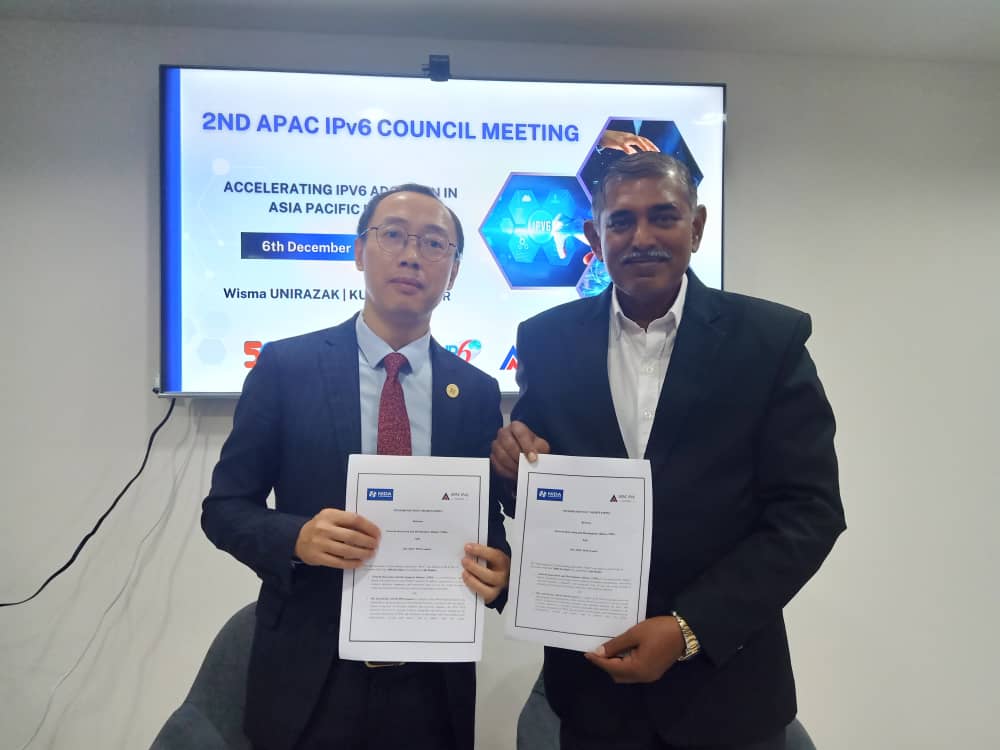
On December 6, 2024, Malaysia time, NIDA Secretary-General Deng Yiou was invited to attend the 2nd APAC IPv6 Council Conference held at Tun Abdul Razak University in Kuala Lumpur, Malaysia, and delivered a speech entitled “Insights into the Evolution of Next Generation Networks.”.
NIDA and APAC IPv6 Council signed a strategic cooperation agreement at this meeting. Based on the Net5.5G consensus, the two sides will strengthen inter-organizational cooperation, jointly carry out technological innovation and industry promotion, jointly promote the deployment and implementation of IPv6 in the Asia-Pacific region, and promote the innovation and development of the Internet infrastructure industry.
This report, titled “5G ASEAN Industrial Development Guidelines,” is designed by the APAC IPv6 Council along with the IPv6 Forum Malaysia, NIDA, RUMC, & USM to provide a comprehensive framework for the deployment, standardization, and application of 5G technologies among industries across the region. It provides insights into both immediate and future requirements for industries looking to leverage 5G to remain competitive in an increasingly digital global economy.
By preparing these guidelines, the Association of Southeast Asian Nations (ASEAN) can play a pivotal role in shaping a digitally empowered future for the region, positioning it as a global leader in 5G innovation and application.

Governments worldwide are now moving towards full IPv6 implementation. APAC IPv6 Council, along with IPv6 Forum Malaysia, assists local businesses and organizations with technology consultation, human capacity building, and upskilling required for the seamless transition to a fully connected IPv6 Malaysia.
As highlighted in the recent Public Consultation paper issued by the Malaysian Communications and Multimedia Commission (MCMC), this initiative marks a significant milestone in enhancing Malaysia’s digital infrastructure, unlocking new opportunities for innovation, scalability, and growth in the digital economy.
The APAC IPv6 Council will remain ever-ready to support the nation in achieving this vision and ensuring that Malaysia remains at the forefront of internet technology evolution.
The Asia-Pacific IPv6 Enhanced & 5G Global Conference was held in Kuala Lumpur, Malaysia recently which saw the unveiling of an IPv6 (Internet Protocol, version 6) Enhanced White Paper framework and the establishment of the Asia-Pacific (APAC) v6 Council.
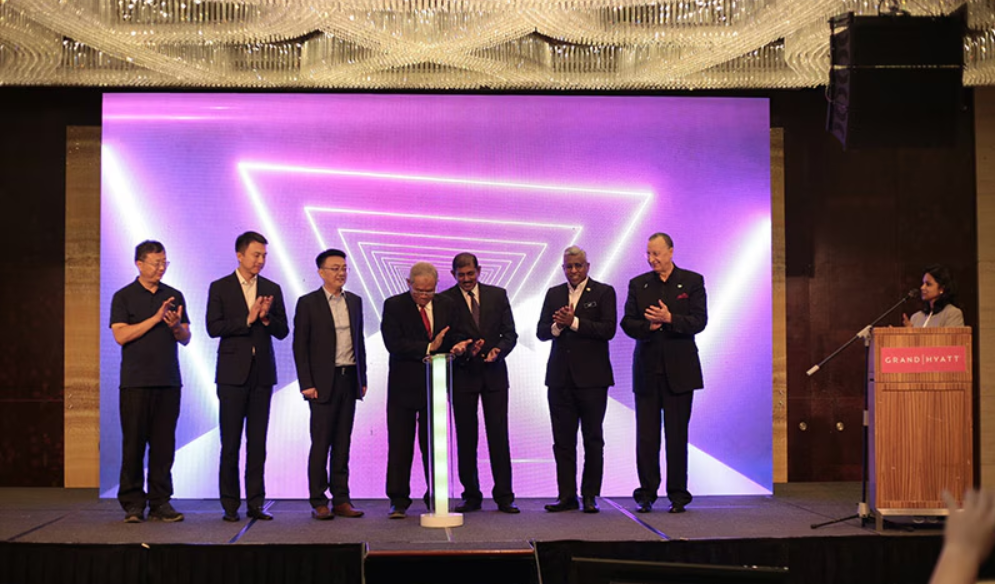
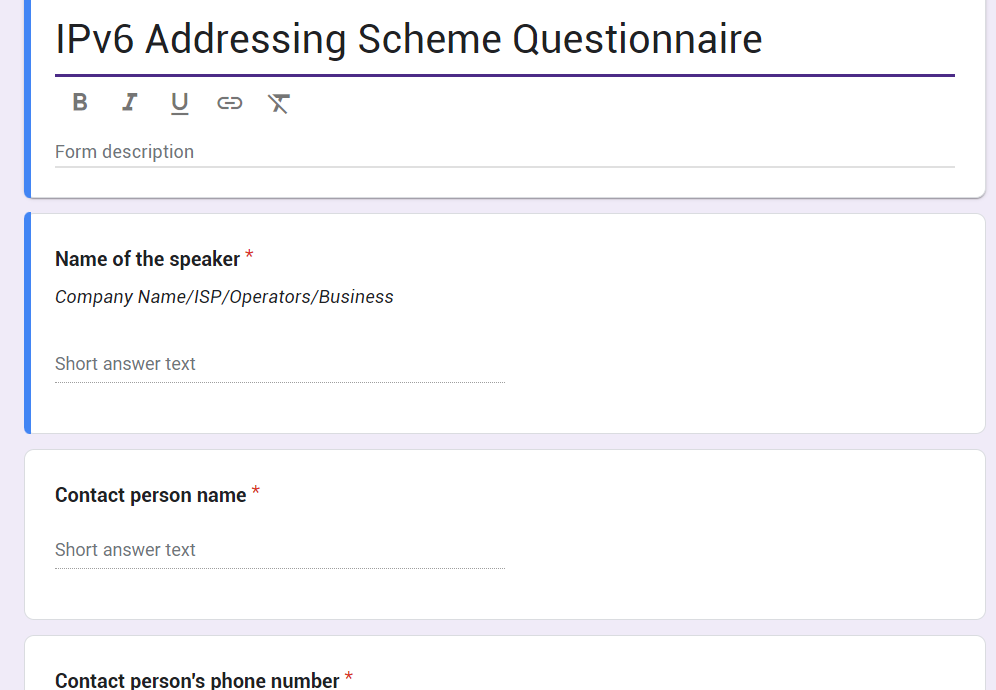
The IPv6 addressing scheme is a document that describes your IPv6 addressing plan and scheme, including details such as:
- The purpose of each subnet.
- The address range assigned to each subnet.
- The prefix lengths used for the subnet.
- The address allocation method (Manual, SLAAC, DHCPv6).
- Security considerations (anti-spoofing, ACL, p2p best practices, and loopback).
- Reserved address ranges.
This document serves as a general guideline for ISPs/Network Operators for their IPv6 Transition. It provides the different stages of IPv6 Transition and Deployment.
The first initiative taken by the APAC IPv6 Council was the release of a whitepaper for the Asia Pacific IPv6 Implementation Roadmap and Guidelines. This whitepaper is a comprehensive exploration of IPv6 and IPv6 Enhanced as indispensable catalysts for the digital transformation that is sweeping across the globe.
The ASEAN Economic Forum works closely with the Asia Pacific IPv6 Council and its partners in their tireless efforts in advancing IPv6 implementation.
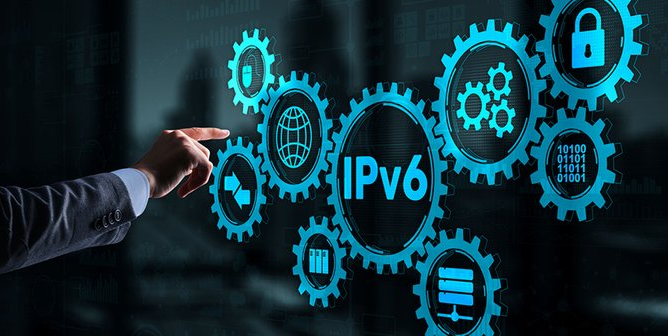
This presentation was shared by the US IPv6 Council. The Council created the first comprehensive IPv6 Cybersecurity course of instruction under contract for the Defense Advanced Research Projects Agency (DARPA) in support of their IPv6 Transition efforts initiated by the 2010 Federal CIO memorandum, directing all federal agencies to continue the transition started in 2005.
The intent of any organization’s cybersecurity approach is to ensure the confidentiality, integrity and availability (CIA)* of IT assets and data. Internet Protocol version 6 (IPv6), based on lessons learned by the Internet Engineering Task Force (IETF) for Internet Protocol version 4 (IPv4), is designed to enhance an organization’s network operations and provide a more secure environment in the hands of trained and experienced engineers.
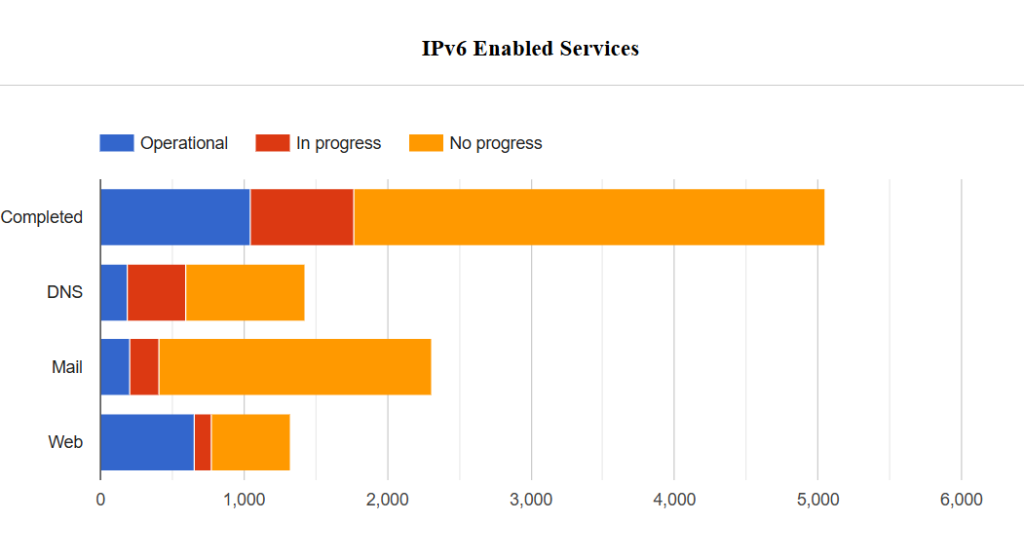
In order to confirm IPv6-enabled devices and to keep track of DNSSEC deployment progress across several government sites in India, Mr. Krishna Kumar Lahoti from CNLabs has shared this link for reference.
